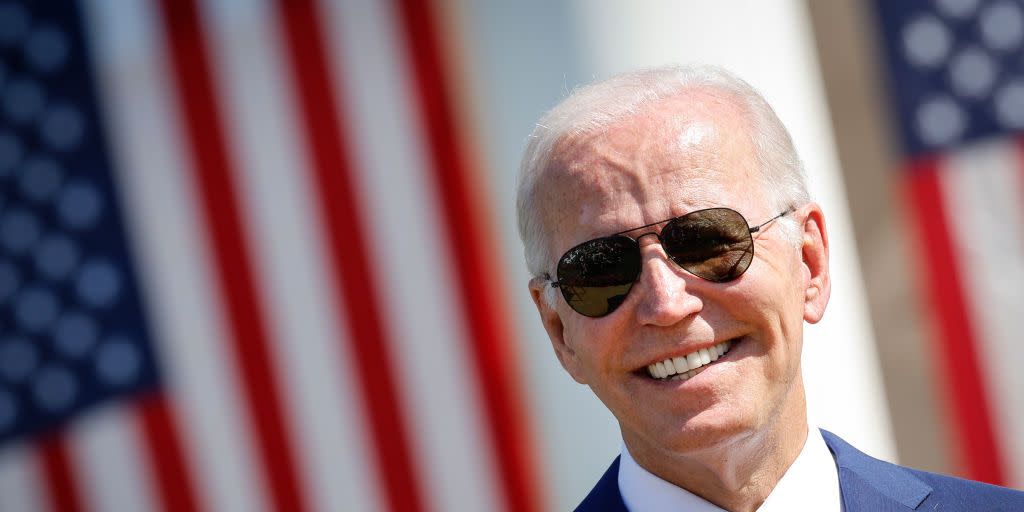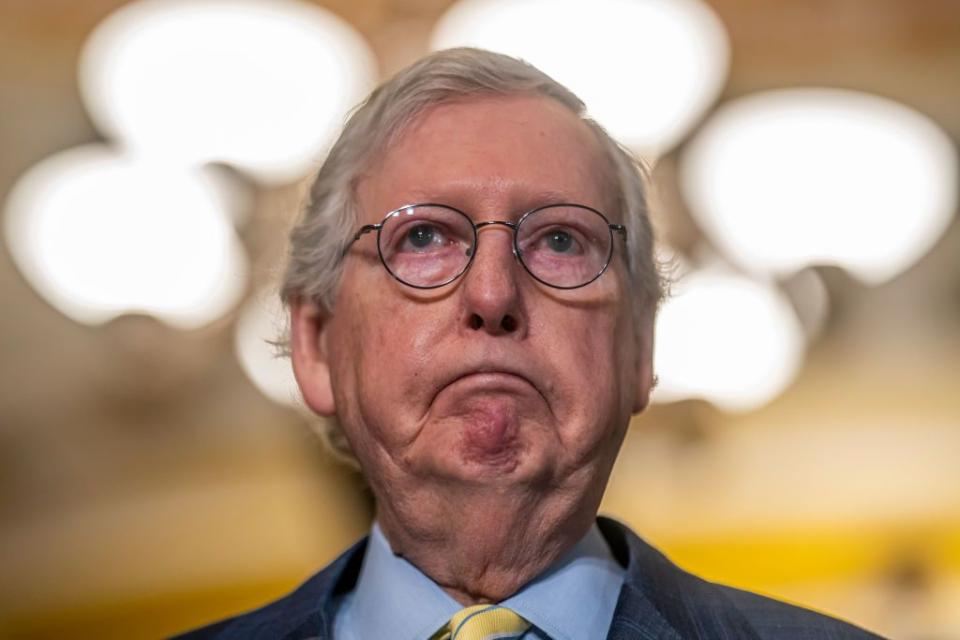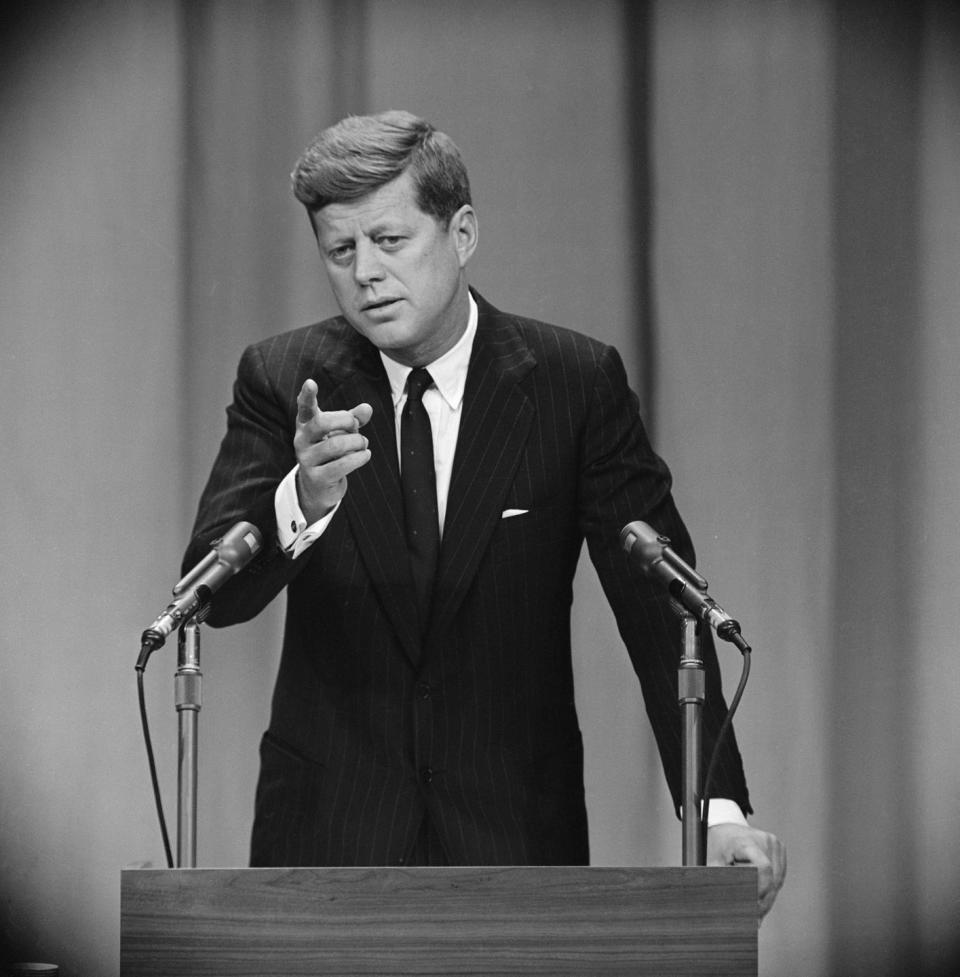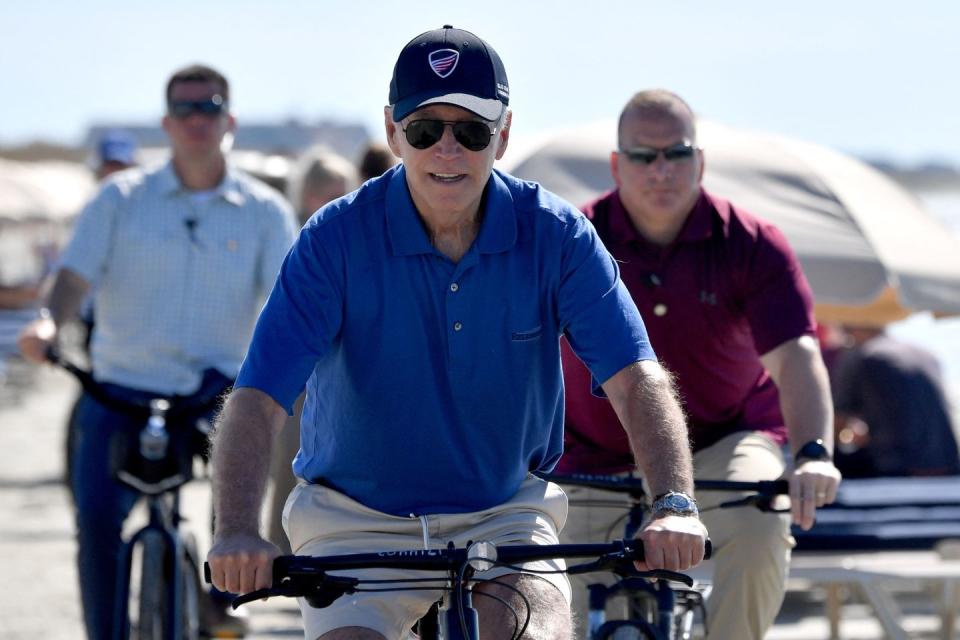Stop Complaining about the ‘Gerontocracy.’ Older People Are More Vital Than Ever.

As he celebrated his 80th birthday in late November, President Joe Biden was taking a victory lap for his party’s stronger-than-predicted performance in the midterm elections. Buoyed by the steady hand of 82-year-old Nancy Pelosi, a fellow Democrat who's stepping away from her leadership role with a reputation as one of the most effective House Speakers in history, the Biden Administration has continued to surprise the pundits by racking up wins and legislative gains—including the Inflation Reduction Act, a landmark piece of climate legislation, and the Butch Lewis Act, which shored up pensions for millions of union workers.
On the Republican side of the aisle, Senate Minority Leader Mitch McConnell, 80, continues to demonstrate the political savvy he's honed over decades on the Hill. Let’s not forget Chuck Grassley (R-IA), 89, who was just elected to his eighth term in the Senate; Patrick Leahy (D-VT), who at 82 is in his eighth term in the Senate; and Kay Ivey, 77, the recently reelected Republican Governor of Alabama. All continue to be effective leaders despite being well past 70.
Yet all of these accomplished politicians and their most experienced peers suddenly find themselves being dismissed as part of a phenomenon that's allegedly a major problem in America today—the power of the “gerontocracy.” That 12-letter perjorative has become trendy among pundits (mostly younger ones) who've adopted the inherently ageist word to suggest that the persistence of older leaders, particularly in politics, is holding our country back. The corollary is that anyone of a particular age should be replaced—by a younger, fresher alternative, naturally. These opinion-makers choose to ignore experience, wisdom, knowledge, competency, and ability. Instead, they focus on age as the metric for political cancellation.
What is it that allows such blatant age discrimination to run so rampant and unchecked, especially in an era of high sensitivity to other forms of discrimination? Ageism affects everyone regardless of gender, race, religious, or political beliefs. Yet businesses feel free to marginalize people at a certain age; advertising and entertainment brands shovel out cliché after cliché of outdated representations of people over 50; and certain elected officials would like nothing more than to reduce the social benefits for an aging population and oust any older political leader.
Why this fixation on age? America, we have a problem.

With older politicians, the conversation also turns to cognitive decline. But the reality is that only 11.7 percent of older adults have some type of cognitive impairment. That's not much higher than the 10.8 percent of adults ages 45 to 65 who are impaired, according to Peter Kaldes, CEO of the American Society of Aging. In addition, The American Academy of Neurology reports that mild cognitive impairment affects only 15 percent of people ages 75 to 79.
In research from a large-scale study at Georgetown University Medical Center conducted in 2021, Michael T. Ullman, PhD, a professor in the department of neuroscience and director of Georgetown’s Brain and Language Lab revealed that functions such as cognition, including memory, decision-making, and more can actually improve with age.
Kaldes points out that in 2020, the U.S. Census identified that voter turnout was robust among 65- to 74-year-old voters. In fact, 80 percent of older adults voted, while only about 50 percent of young adults 18 to 24 went to the polls. For people in the 25 to 44 age bracket, the portion grew who voted grew, but only to 62 percent. If younger people are dissatisfied with older politicians, they might participate more in the process, both as candidates and voters. To be fair, the exit polls in the recent midterms have indicated that younger voters turned out in much bigger numbers. Let’s hope it is a growing trend.
The excuse that older politicians don’t make way for younger ones is another false construct. Viable candidates should get out there and challenge the field with policies that excite a younger base. By the way, that’s what Bernie Sanders did and a reminder that he did it at age 74. Maybe we need a new definition of next generation leadership based on how someone addresses the issues versus their age.
The idea of putting an age limit on politicians or any profession is an outdated and silly idea. People in business, elected officials, and other leaders can lose their mojo at 50, and that might be a right reason for them to step down from a role at that point. Others thrive into their 80s, continuing to make huge contributions. Konrad Adenauer, the first Chancellor of the Federal Republic of Germany, is a great example of an effective leader who remained in office until he was 87.
Those who advocate that there should be age limits for politicians like to point out that George Washington left office at age 65 in 1797. What they conveniently forget to mention is that the average life expectancy of Americans back then was around 38. Relative to the times, Washington was quite old. His decision not to run again had nothing to do with his age, however. Rather it was to set the standard of a two-term limit for the presidency.

If anything, more life experience should be required to be the Leader of the Free World. I would advocate that we should raise the age to be eligible to run for President. What kind of experience and gravitas would a 35-year-old have in order to hold that office in today’s complex world?
The State Department requires foreign service employees to retire at 65 when they are at the height of their wisdom and knowledge. Maybe that policy worked when life expectancies were in the sixties, but it’s an archaic idea today. The knowledge that these career diplomats bring could serve us well, especially in a volatile world.
The same issues exist in the business world. Recently, I spoke to a former partner at one of the big established accounting firms. He was required by company policy to retire at 60. But he said that he and many of his peers would be happy to work another 10 years or more. As he described the neatly designed two-year-plan to help “off-board” people that begins when they turn 58, it reeked of institutional ageism. The current CEO of the company is 59. Let's hope he's getting ready for the big push out the door.
It's Always Generational
It’s true that every generation likes to throw the older generation under the bus. I’m a Boomer, so I know all about that play. We couldn’t wait to get rid of our elders. In fact, our generational slogan was, "Don’t trust anyone over 30!" We too had ageism in our DNA. When the first Boomers became 21 in 1967, the U.S. life expectancy had just hit 70 years old and most people saw the big decline and end in front of them when they turned 65. We were ready to push them all aside to hasten their expiration date.
Along our journey we fought for civil rights, women’s rights, gay rights, and more, but we forgot that someday we would face the bigger existential threat of ageism. We never had the generational foresight to anticipate that we would become a part of what would be the largest tribe of 50-plus-year-olds who ever lived on the planet. Over the next decades, there will be more people aged 70 to 100 alive than at any time in human history. The fight against ageism will have a lot of voices.
Ask any 50-plus year old person if they have experienced any kind of ageism and you’ll get a head nod. In a cross-sectional study of 2,035 U.S. adults ages 50 to 80 in the 2019 National Poll on Healthy Aging, a stunning 93.4% reported some type of everyday ageism. The findings suggested that ageist messages, interactions and beliefs are in fact harmful to one’s health. It is a deep- seated phenomena in our country often times fueled by the media that is headed for a cultural collision.
Unless we have a reckoning on this front, we are going to have a lot of disgruntled neighbors, colleagues, and clients. There are already 117 million Americans over 50. By 2034, the U.S. will have more citizens over age 65 than those under 18. It will be a massive population bulge that will impact how the population as a whole views the world, including what they will want from government and leaders. It will also lead to a different view of the age of candidates.
The Origins of Ageism
How did ageism develop such a strong strain in America?
One of the turning point moments was the Industrial Revolution. Its focus on productivity and efficiency which pushed older people (and in those years it included those in their 40’s) out of the workforce, as the concern was that they couldn’t adapt, according to Tracey Gendron, an associate professor and chair of the department of gerontology at Virginia Commonwealth University.
In her book, Ageism Unmasked: Exploring Age Bias and How to End It, she provides a fascinating read on how we got here. Following on the heels of that was the creation of retirement as an accepted life stage that represented withdrawal from society versus a social institution that delivered benefits, creating another moment that helped set us on this path. At the time, life expectancy was around 62.
While ageism can be traced back much further, these movements in the early 20th century set a pattern that still exists today, seeping into all aspects of society, including politics. What hadn’t been anticipated was that due to advances in medicine and other factors, life expectancies would have a higher percentage growth in the last century than all previous millennia combined. Living and working longer is our collective future.
Another moment that reinforced ageism was the birth of the “youth culture” designed to capture the baby boomers when they were in their teens and early twenties. Advertising and media from The Pepsi Generation to MTV and countless others jumped in to attract them. In 1960, for instance, the whole country was swept up in the phenomenon, which helped John F. Kennedy, who was 43 when he was sworn in, become the youngest person to be elected President in our history.
A Socially Acceptable Bias
According to Chip Conley, founder and CEO of the Modern Elder Academy, a midlife wisdom school dedicated to lifelong learning, ageism is the last socially acceptable bias. “Americans size up each other by youthful looks, body type and money versus deeper attributes like wisdom and emotional intelligence,” he said, adding that “since aging is noticeable, it becomes a proxy for judgement within organizations.”
That’s a core tenet to ageism within the corporate world and it spills into the political sphere. Don’t we want our politicians to have the benefit of experience and gravitas?
Dr. Mark Lachs, a professor of medicine at Weill Cornell Medicine and director of geriatrics for New York Presbyterian Health Care System in New York City asks, “How is ageism different than racism or sexism?”
He would argue that aging begins in utero and continues from the moment we are born. It’s all a question of degrees. Throughout our lives, we are developing chronic conditions as we age. With devices like Fitbit and the Apple watch, both tools for a “quantified self,” Lachs suggests that people in their 30s will begin to see how they are aging through the data that is now available to them.
He also explained that, by age 75, most people will have two to three chronic conditions, but they might be something like arthritis or high blood pressure, conditions that can also affect a 40-year-old. The key is to maintain a high quality of life as we all gain some inevitable diagnoses, some serious, some not.

In a recent Washington Post article regarding Biden’s age, it was reported that the president’s gait had become “stiffer and less fluid,” highlighting a case of spinal arthritis and the lingering effects of a foot fracture. He also has seasonal allergies and reflux that can cause persistent coughing and throat-clearing. But none of these issues affect his ability to do the job. The Post article quoted Kevin O’Connor, Biden’s physician, who said in medical examination records released almost a year ago, that the president was “fit for duty” and capable of executing his responsibilities without complication.
Lachs, the professor of medicine at Weill Cornell, partly blames the medical profession for many of the ageist signals they send to our culture. “Because we do not have a system of national health insurance, competition between rival healthcare systems lead to overpromising and the idea that any disease can be cured and that aging, chronic conditions, and death are optional,” he said.
Perhaps we need to stop generational name calling and think about generational cooperation to solve some of the issues facing us as a nation. We can start by ditching that derogatory label: gerontocracy.
Breaking Down the Age Barrier
Marci Alboher is a vice president at CoGenerate, a nonprofit that brings older and younger change-makers together for problem solving and co-creating a better future. Her group commissioned NORC at the University of Chicago to survey a nationally representative group of 1,549 American adults, aged 18 to 94 in March 2022 to research this idea. In their report, “Is America Ready to Unleash a Multigenerational Force for Good,” they uncovered a number of optimistic findings, including the notion that people of all ages want to work across generations to help others and improve the world around them. It all leads to breaking down age as a barrier.
Lachs wants his first-year medical students to have a good understanding of the aging process. At Weill Cornell Medicine each student is assigned to a patient for their four-year training; many are older. This enables them to see the patient both holistically and medically. It’s also a great way to create intergenerational relationships, according to Lachs. Imagine if every newly elected official was officially assigned an older mentor to understand the ins and out of the corridors of power in getting things done.
Tackling systemic ageism is a challenge facing all of us. It is critical for the future of our country and much of the developed world which is entering a period where older is going to be what drives our economies, policies and social norms.
Those who have lived and worked longer, whether it is in government or business, bring enormous perspective to our world. It’s time to revere what they know and what they can continue to accomplish.
The 2024 presidential field is already starting to take shape. While Biden has not declared his intentions to run again, many are expecting him to do so. Former President Trump has jumped in the race at 76 and others will follow. As the field expands, let’s focus on the right criteria of competence and ability, along with trust, integrity, honesty, and a commitment to our Democracy. Whether someone is 40 or 80 shouldn’t matter. It’s time to move on to more important considerations.
You Might Also Like


